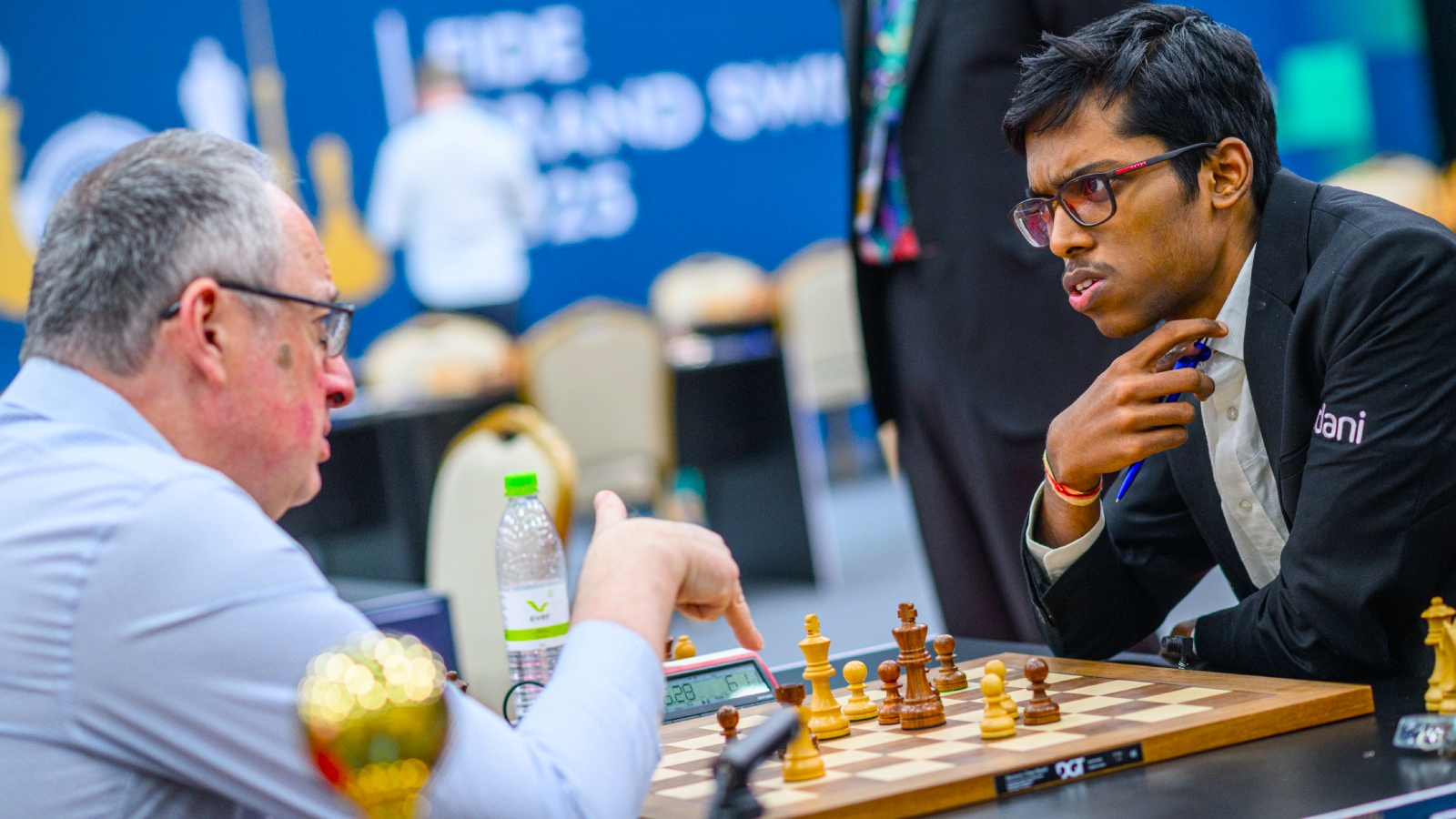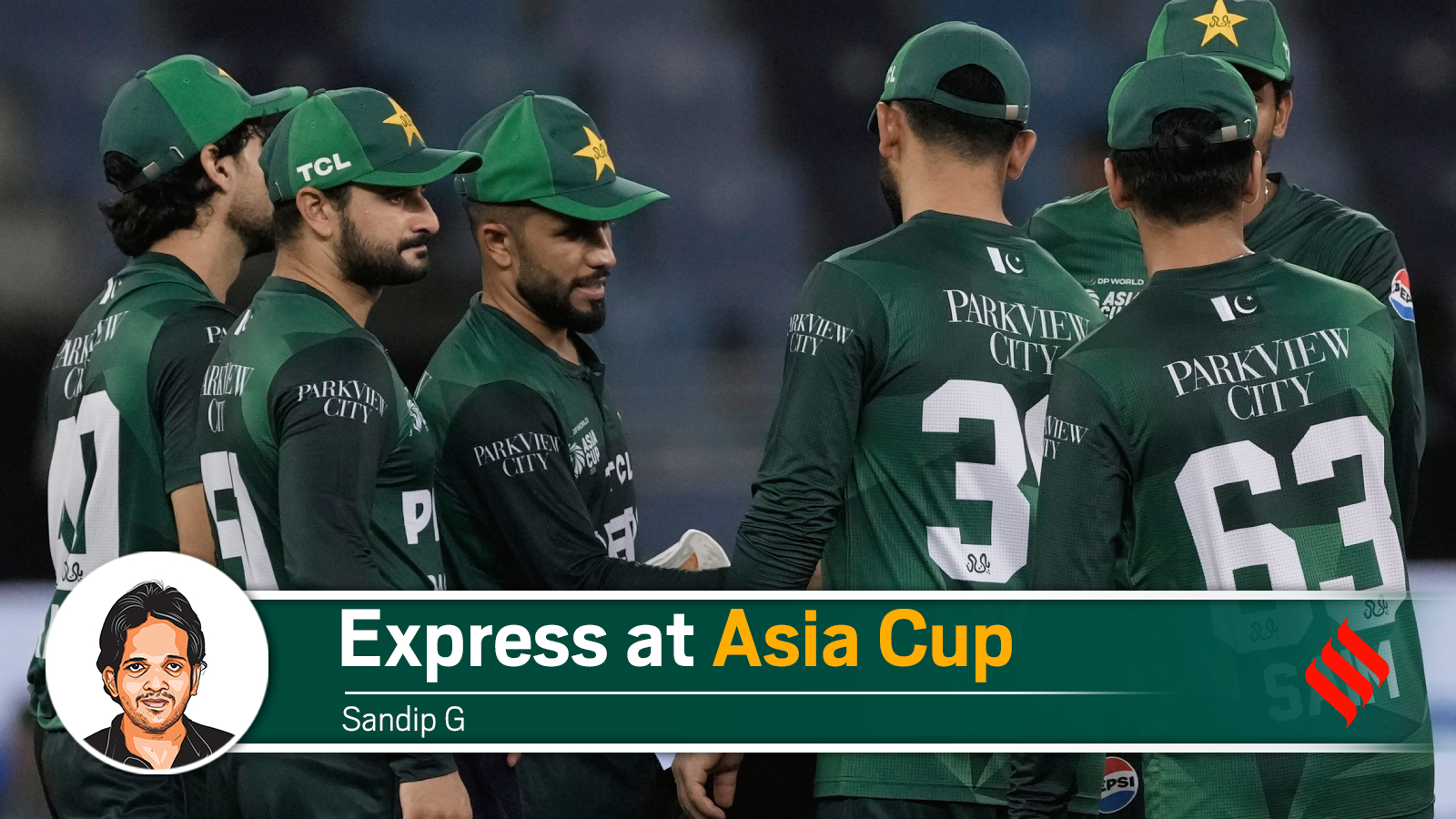ARTICLE AD BOX
 (L to R) Alexei Shirov, Vasyl Ivanchuk and Boris Gelfand at the FIDE Grand Swiss chess tournament in Samarkand. (PHOTOS: FIDE via Michal Walusza)
(L to R) Alexei Shirov, Vasyl Ivanchuk and Boris Gelfand at the FIDE Grand Swiss chess tournament in Samarkand. (PHOTOS: FIDE via Michal Walusza)
Vidit Gujrathi leans back in his chair with an expression that signals equal parts heartache and backache. He’s understandably exasperated. Who wouldn’t be, especially after being dragged through the marshy waters of an endgame for hours in a battle that he should have won at least two hours ago. He shoots daggers with his eyes at his tormentor, Vasyl Ivanchuk. The Ukrainian GM doesn’t notice, he’s sitting hunched over the board, obsessively pulling away at one eyebrow, with eyes only for the wooden pieces. Soon, Vidit decides to end his own suffering and offers a draw, which Ivanchuk accepts with a shrug.
 India’s Vidit Gujrathi reacts during his game against Vasyl Ivanchuk at the FIDE Grand Swiss in Samarkand. (PHOTO: FIDE via Michal Walusza)
India’s Vidit Gujrathi reacts during his game against Vasyl Ivanchuk at the FIDE Grand Swiss in Samarkand. (PHOTO: FIDE via Michal Walusza)
Over a hundred teens, 20- and 30-somethings have descended upon Samarkand to play in the FIDE Grand Swiss tournament with dreams of securing qualification for the Candidates tournaments in their eyes. But there are also a few like Ivanchuk, Boris Gelfand and Alexei Shirov, who are in the twilight of their careers—all three well into their 50s—that have made the journey to Uzbekistan, just looking for a fight on the chessboard. They have nothing to prove anymore in the sport, accomplished as they are with decades of legacy already behind them. But they seem to enjoy playing only for the sake of playing, if only to tell the Grim Reaper of chess careers, ‘Not today’.
After five rounds in what is the world’s strongest Swiss tournament, the 56-year-old Ivanchuk and the 53-year-old Shirov find themselves in the chasing pack with three points — a competitive score considering they are joined on the tally by world champion Gukesh Dommaraju, Praggnanandhaa and two-time world championship contender Ian Nepomniachtchi.
Ivanchuk, in particular, has been involved in a few six-hour-long battles already at Samarkand, with four draws and a win. Shirov, just like Ivanchuk, is unbeaten, while Gelfand suffered his only defeat to Praggnanandhaa, a boy he helped shape at Viswanathan Anand’s Westbridge Anand Chess Academy (WACA) as a mentor.
 Chess legend Boris Gelfand analyses the game with Praggnanandhaa after losing to the Indian in round 3 of the FIDE Grand Swiss tournament. (PHOTO: FIDE/Michal Walusza)
Chess legend Boris Gelfand analyses the game with Praggnanandhaa after losing to the Indian in round 3 of the FIDE Grand Swiss tournament. (PHOTO: FIDE/Michal Walusza)
In the form of Shirov and Gelfand, we have two veterans who lost world chess championship battles to Vishy Anand: Shirov was bested by the Tiger from Madras in the knockout World Championship format in 2000 in Tehran while Gelfand lost to Anand in 2012 in Moscow.
Both Gelfand and Shirov make rare appearances at tournaments these days. Despite that, the recent run of results shows that they can still mix it with the best when needed to.
“It’s very challenging (playing here) because I didn’t play much this year. I’m thankful to FIDE that they gave me a wild card. I had initially thought that I would qualify by my rating itself. But later it turned out that tournament rules stipulated that I had to be more active. I played more rapid tournaments this year than classical. But I’m very excited to play here,” says the 57-year-old Gelfand.
Story continues below this ad
Ivanchuk is also a man that older Indian chess fans will remember. A contemporary of Viswanathan Anand from their teenage days, he’s the closest thing to a nemesis Anand had outside the narrow circle of world championship chess battles.
“He was a tricky opponent all my life,” Anand had once recounted on the Conversations with Tyler Podcast. “For many years, he would ignore the rest of the tournaments. He almost couldn’t concentrate against the others. Then, when he came against me, you knew he’d been waiting the whole week for this one game. It was annoying to have such a mark on your back. There’s this one guy who is just thinking of you all the time, while you’re thinking of all your opponents.”
“With him, it’s always psychology— things like watching his face — which mattered more than the actual moves. Ivanchuk’s level can vary enormously. He’s even more vulnerable psychologically than many others. If he’s not in the right frame of mind, his level can plummet. Equally, he can suddenly motivate himself to do great things. The hardest problem, even, is that he looks totally distracted during the game,” Anand had said.
Anand has semi-retired from chess, and devotes his time to his responsibilities as FIDE Deputy President, besides doing commentary gigs occasionally. Ivanchuk, meanwhile, still picks up his chess levels whenever someone from the generation of Indian youngsters called ‘Vishy’s children’ comes along. At the Menorca Open earlier this year, for instance, Ivanchuk had beaten Nihal Sarin and Pranesh en route to winning the title.
Story continues below this ad
 Vasyl Ivanchuk at the FIDE Grand Swiss chess tournament in Samarkand. (PHOTO: FIDE via Michal Walusza)
Vasyl Ivanchuk at the FIDE Grand Swiss chess tournament in Samarkand. (PHOTO: FIDE via Michal Walusza)
At Samarkand, Ivanchuk is repeatedly asked in interviews about the experience of facing players one third his age. “I’m not thinking about age. I’m focused on the play. The moves. On ideas. I am just trying to understand the playing style of each of my opponents and concentrate on the game.”
In one of his interviews, he’s asked if he’s been to Samarkand before. His reply betrays his age. “Yes, I have been to Tashkent. Back in Soviet Union times.”
The Grand Swiss enters the second half on Tuesday with the sixth round. Players like Gelfand, Shirov and Ivanchuk might just surprise us with an assault at a Candidates spot. Even if they don’t succeed, they’ll be on their boards, tormenting much younger players through long games.



.png)
.png)
.png)
























 English (US) ·
English (US) ·